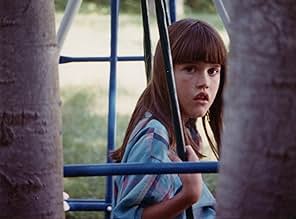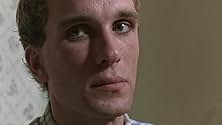CALIFICACIÓN DE IMDb
7.0/10
6.2 k
TU CALIFICACIÓN
Después de que un hombre que sufre de esquizofrenia es dado de alta de una institución mental, intenta recuperar a su hija de su familia adoptivaDespués de que un hombre que sufre de esquizofrenia es dado de alta de una institución mental, intenta recuperar a su hija de su familia adoptivaDespués de que un hombre que sufre de esquizofrenia es dado de alta de una institución mental, intenta recuperar a su hija de su familia adoptiva
- Dirección
- Guionista
- Elenco
- Premios
- 5 premios ganados y 6 nominaciones en total
- Dirección
- Guionista
- Todo el elenco y el equipo
- Producción, taquilla y más en IMDbPro
Argumento
¿Sabías que…?
- TriviaPeter Greene's first line comes eighteen minutes into the movie.
- ErroresMurdered girl's corpse visible breathing.
- Citas
Peter Winter: I was in a, in a hospital bed, and I had been operated on. And they had put a, a small receiver in the back of my head and a transmitter in my finger. You know what they are?
Nicole Winter: A radio?
Peter Winter: Yeah, a radio. Anyway, to get at the transmitter, I had to take my fingernail off.
Opinión destacada
Peter Winter (Peter Greene) is a tormented schizophrenic man who is let out of a hospital despite suffering from extreme symptoms of nearly continuous auditory hallucinations, paranoia, and a highly fragmented, discontinuous sense of reality. His one steady goal is to find his young daughter, Nicole (Jennifer MacDonald), who has begun a new life as an adoptee, following the murder of her mother. Peter first visits his own mother, a taciturn, emotionally withholding woman who is not at all pleased to see him. Later he discovers his daughter's whereabouts, when her adoptive mother brings Nicole to visit her grandmother (who is as chilly toward Nicole as she is toward Peter). Meanwhile, a police detective (Robert Albert), searching for a serial child killer, has concluded that Peter is his man. A fateful ending is set up when the detective encounters Peter with Nicole at an isolated beach.
There are serious flaws in this film: the screenplay is not well wrought and is too full of ambiguities, especially the entire serial child killing subplot. This is highly distracting. The acting is second rate, except for Greene's and MacDonald's performances. The film's strength lies in Kerrigan's insightful deployment of sound, setting and other effects to create the clinical realism of Peter's schizophrenic experience. Peter's intense, perpetual fear is palpable. Much of the film is shot in his car, where he has placed masking tape over the mirror, and newspaper over several windows, to fortify his privacy. The effect is an impacted atmosphere of paranoid insulation. Peter's hallucinated auditory experience garbled voices, static and other noise, unaccompanied by any visual representations is clinically valid. The voices and noise haunt him steadily. He tells Nicole he has had a radio device implanted in his head, with a transmitter in a fingernail. Earlier we had been exposed to his violent efforts to rid himself of these devices using scissors or a knife to gouge them out forms of delusion-driven self-mutilation that are uncommon but not rare in persons suffering the throes of severe acute psychotic episodes. The use of tight close up camera angles - viewing Peter from just behind his back or in profile in his car - heighten the sense of claustrophobia, the extreme narrowing of Peter's psychotic world. The setting - Miscou Island, in New Brunswick adds further accents of wildness and isolation to the overall tone of the film.
It can be argued that the detective's pursuit of Peter adds yet another source of paranoid fever to the film, though for me this conceit does not ring true. The fact that someone really is after Peter detracts from the power of his delusions. Other than this, Kerrigan can be congratulated for steering clear of the false visuals (realistically visualized imaginary friends and enemies) and other clinically implausible effects that Ron Howard used more recently in A Beautiful Mind. Anyone professional or lay viewer might rightly wonder how Peter could be discharged from the hospital in such poor psychiatric condition. Of course that happens every day in most contemporary short stay hospital settings, because involuntary treatment laws in most states prohibit keeping patients against their will except in the most extreme circumstances of immediate potential for violence. But we are given the impression at the start of this film that Peter had been incarcerated in a more traditional mental hospital, the sort in which people stay for long periods before discharge, until they appear relatively free of symptoms, sometimes longer. Of course these large old facilities are typically short staffed, keen clinical observation of patients may be scarce, and patients not uncommonly can muster a façade of normality to win their freedom.
The depiction of Peter's mother is also troublesome. Her grim withholding of affection for Peter and Nicole resurrects the spectra of the 'schizophrenogenic mother' a psycho dynamic fiction popular the 1950s and 60s that accused parents, especially mothers, of causing schizophrenia through self serving, unaffectionate regard for their children. This myth was laid to rest long ago, and it is a black mark against this film to see such a notion resurrected. It does not dispel the power of this negative maternal portrayal when, from a distance, we see the mother crying as she hangs one of her son's shirts on a clothesline near the end.
Clean, Shaven shares with David Cronenberg's film, Spider, the distinction of offering the most believable portraits of highly symptomatic schizophrenic experience that have been brought to the big screen. I prefer Spider because the acting is uniformly first rate and the screenplay is superior. Both films pull the viewer into an exquisitely painful, odd, lonely, and ultimately unrewarding world, into experiences that many moviegoers would, no doubt, prefer to avoid. Dramatically, this is a "C" movie, but the portrayal of schizophrenia rates an "A."
There are serious flaws in this film: the screenplay is not well wrought and is too full of ambiguities, especially the entire serial child killing subplot. This is highly distracting. The acting is second rate, except for Greene's and MacDonald's performances. The film's strength lies in Kerrigan's insightful deployment of sound, setting and other effects to create the clinical realism of Peter's schizophrenic experience. Peter's intense, perpetual fear is palpable. Much of the film is shot in his car, where he has placed masking tape over the mirror, and newspaper over several windows, to fortify his privacy. The effect is an impacted atmosphere of paranoid insulation. Peter's hallucinated auditory experience garbled voices, static and other noise, unaccompanied by any visual representations is clinically valid. The voices and noise haunt him steadily. He tells Nicole he has had a radio device implanted in his head, with a transmitter in a fingernail. Earlier we had been exposed to his violent efforts to rid himself of these devices using scissors or a knife to gouge them out forms of delusion-driven self-mutilation that are uncommon but not rare in persons suffering the throes of severe acute psychotic episodes. The use of tight close up camera angles - viewing Peter from just behind his back or in profile in his car - heighten the sense of claustrophobia, the extreme narrowing of Peter's psychotic world. The setting - Miscou Island, in New Brunswick adds further accents of wildness and isolation to the overall tone of the film.
It can be argued that the detective's pursuit of Peter adds yet another source of paranoid fever to the film, though for me this conceit does not ring true. The fact that someone really is after Peter detracts from the power of his delusions. Other than this, Kerrigan can be congratulated for steering clear of the false visuals (realistically visualized imaginary friends and enemies) and other clinically implausible effects that Ron Howard used more recently in A Beautiful Mind. Anyone professional or lay viewer might rightly wonder how Peter could be discharged from the hospital in such poor psychiatric condition. Of course that happens every day in most contemporary short stay hospital settings, because involuntary treatment laws in most states prohibit keeping patients against their will except in the most extreme circumstances of immediate potential for violence. But we are given the impression at the start of this film that Peter had been incarcerated in a more traditional mental hospital, the sort in which people stay for long periods before discharge, until they appear relatively free of symptoms, sometimes longer. Of course these large old facilities are typically short staffed, keen clinical observation of patients may be scarce, and patients not uncommonly can muster a façade of normality to win their freedom.
The depiction of Peter's mother is also troublesome. Her grim withholding of affection for Peter and Nicole resurrects the spectra of the 'schizophrenogenic mother' a psycho dynamic fiction popular the 1950s and 60s that accused parents, especially mothers, of causing schizophrenia through self serving, unaffectionate regard for their children. This myth was laid to rest long ago, and it is a black mark against this film to see such a notion resurrected. It does not dispel the power of this negative maternal portrayal when, from a distance, we see the mother crying as she hangs one of her son's shirts on a clothesline near the end.
Clean, Shaven shares with David Cronenberg's film, Spider, the distinction of offering the most believable portraits of highly symptomatic schizophrenic experience that have been brought to the big screen. I prefer Spider because the acting is uniformly first rate and the screenplay is superior. Both films pull the viewer into an exquisitely painful, odd, lonely, and ultimately unrewarding world, into experiences that many moviegoers would, no doubt, prefer to avoid. Dramatically, this is a "C" movie, but the portrayal of schizophrenia rates an "A."
- thecineman
- 27 jun 2004
- Enlace permanente
Selecciones populares
Inicia sesión para calificar y agrega a la lista de videos para obtener recomendaciones personalizadas
- How long is Clean, Shaven?Con tecnología de Alexa
Detalles
Taquilla
- Presupuesto
- USD 68,000 (estimado)
- Total en EE. UU. y Canadá
- USD 26,351
- Total a nivel mundial
- USD 26,351
Contribuir a esta página
Sugiere una edición o agrega el contenido que falta

Principales brechas de datos
By what name was Clean, Shaven (1993) officially released in India in English?
Responda



























